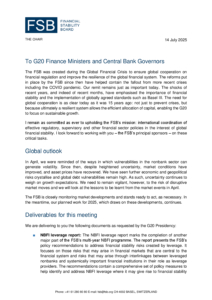- In his first letter to G20 Finance Ministers and Central Bank Governors as FSB Chair, Andrew Bailey stresses the importance of international coordination on financial regulation against the backdrop of geopolitical tensions.
- Mr Bailey highlights his priorities for the FSB, namely enhancing surveillance capabilities, addressing key risks to financial stability, and strengthening the effectiveness of the FSB.
- He also presents the latest report on the FSB’s climate roadmap, which sets out for the G20 that the focus of the FSB climate work in the medium term will be international coordination, information sharing, and strengthening the analysis of the potential for climate-related financial vulnerabilities.
The Financial Stability Board (FSB) today published a letter from its Chair, Andrew Bailey, to G20 Finance Ministers and Central Bank Governors ahead of their meeting on 17-18 July.
In his first letter as FSB Chair, Mr Bailey calls for continued global cooperation and engagement, particularly against the backdrop of geopolitical tensions and rising fragmentation risk.
Mr Bailey outlines his priorities for the FSB, notably:
- Enhancing surveillance capabilities: the FSB and national authorities’ assessment tools and surveillance capabilities must adapt to the evolving financial system to detect vulnerabilities and allow a targeted, evidence-based response to risks. As part of this, the FSB is to set out concisely – and publish – its assessments of vulnerabilities.
- Addressing key risks to financial stability: alongside giving more focus to existing initiatives such as the G20 cross-border payments roadmap, the FSB will: (i) support robust implementation of agreed policies on Nonbank Financial Intermediation (NBFI); (ii) explore vulnerabilities from the growing role of private finance; (iii) assess the increasing role of stablecoins for payment and settlement purposes.
- Strengthening the effectiveness of the FSB: the G20 Implementation Monitoring Review will be the starting point for considering possible improvements in the FSB effectiveness, not just with regard to the implementation of agreed standards, but also in other areas such as communicating with stakeholders outside of its membership.
The letter covers three reports the FSB is delivering to the G20: (i) the FSB’s policy recommendations to address financial stability risks created by leverage in nonbank financial intermediation, (ii) a workplan to address challenges related to nonbank data – both of which were published last week; and (iii) a report updating on work conducted under the FSB Climate roadmap and outlining the FSB’s medium-term approach to potential climate-related financial risks, delivered together with the Chair’s letter.
Background
The FSB coordinates at the international level the work of national financial authorities and international standard-setting bodies and develops and promotes the implementation of effective regulatory, supervisory, and other financial sector policies in the interest of financial stability. It brings together national authorities responsible for financial stability in 24 countries and jurisdictions, international financial institutions, sector-specific international groupings of regulators and supervisors, and committees of central bank experts. The FSB also conducts outreach with approximately 70 other jurisdictions through its six Regional Consultative Groups.
The FSB is chaired by Andrew Bailey, Governor of the Bank of England. The FSB Secretariat is located in Basel, Switzerland and hosted by the Bank for International Settlements.




